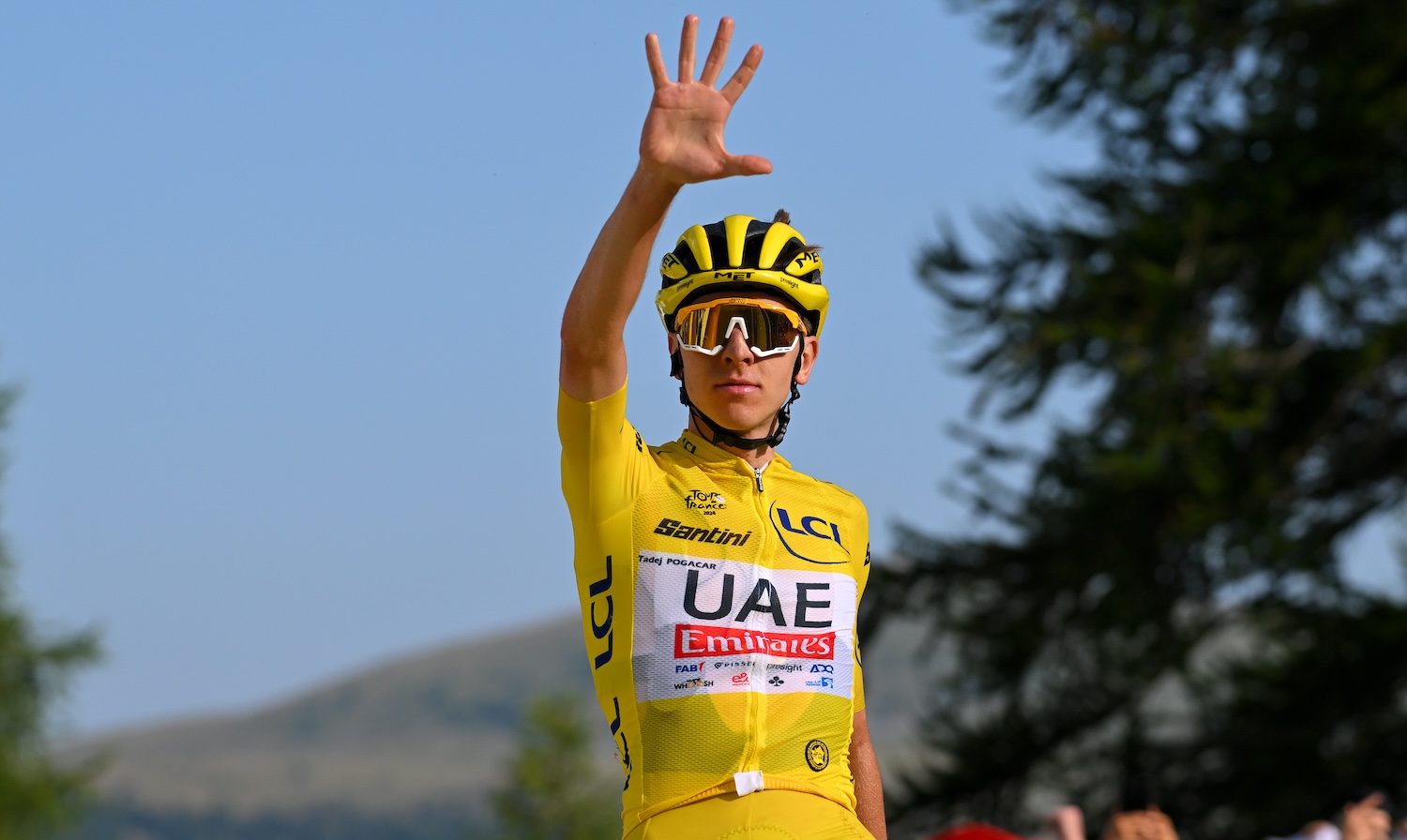An image from Tadej Pogačar's imperious 2024 Tour de France that will stick with me: Visma teammates Matteo Jorgenson and Jonas Vingegaard atop the Isola 2000, slumped over with their heads drooping onto their handlebars, drained and despondent after summiting the fearsome climb. Pogačar has just dropped Vingegaard, formally ending his yellow jersey challenge, before gobbling up Jorgenson's 2:44 gap in just under seven kilometers to take his fourth stage win and stack another 100 seconds onto his already gaudy lead.
The image is moving because it expresses benthic disappointment in the present and future tense. Jorgenson is about to dissect his heartbreak at losing a stage he wouldn't have lost to any other rider, while Vingegaard is on his way to weep in his wife's arms in front of the world. NBC's Tejay Van Garderen will soon grouse through a TV segment about how Jorgenson was denied a deserved win because Pogačar picked an "unnecessary fight." Echoing the more disgraced corners of American cycling media, he will admit to "having trouble finding what the purpose" of Pogačar winning again when he'd already won three times. Purpose and necessity are redundant frames in the context of a bike race: The purpose is to win. There is nothing rational or just about it. The day after Pogačar ripped out Jorgenson's heart, he won Stage 20. The next day, he won Stage 21. His third Tour de France victory was a masterpiece of greed, a rider of frankly terrifying talent rounding into his prime and taking everything he could from any rider who opposed him. It is foreboding to make sense of.
A Tour de France is always bigger than one rider. That's what makes it so charming. There is not enough to go around, but there is something for every rider to fight for every day. One way to gauge Pogačar's dominance is to gawk at the way he wiped a Tour's worth of possibilities away from several phyla of riders. Any climber who wanted to win out of a breakaway on a mountain stage, like Jorgenson, found themselves denied at every turn by Pogačar. His team was so strong that they took three of the top six general classification spots, and huge teams like Ineos, Red Bull, and Lidl-Trek left the Tour with essentially nothing. How could they have? They were pursuing the same aims as Pogačar.
What is essential to remember here is that Pogačar knows what losing is like. For someone of his talent, with the legs to win the Tour de France and a LeBron James-like grasp of the history of his sport and his legacy within it, finishing second is not a welcome consolation prize for a job nearly done, it is a loss, and he thought about his consecutive runner-up finishes as such. The best competitors in any sport have to have a nearly irrational level of self-belief, though cycling requires an equal dose of self-knowledge. Racing for a goal three weeks away means measuring efforts, and it would have made grim sense for someone of Pogačar's exuberance to mount his third challenge for the yellow jersey through cautious, steady riding. Cycling's brutality and Pogačar's Little Rascal act seemed mutually opposed.
Perhaps no level of self-belief is irrational for Pogačar, and perhaps he learned enough about himself to realize that. He chased down the bitter taste of losing with easily the best season of the century, and the difference is that he is racing even more aggressively than ever before. His six stage wins are the most for a yellow jersey winner since Bernard Hinault won six in 1979. He pulled off the sport's first Tour-Giro d'Italia double since the pharmacologically stupendous Marco Pantani did so in 1998, won Liège–Bastogne–Liège by 1:39, and won Strade Bianche with an 80-kilometer solo attack. The low point was a podium finish at Milan-San Remo, which is not a race he has any business coming that close to winning. His control over the 2024 Tour de France field is as complete as Chris Froome's ever was, only Froome won a total of seven stages in his career. Lance Armstrong never won more than five in a single Tour. It is impossible to talk about Pogačar's performances this season without resorting to superlatives, or considering his place in the history books.
The notion of assorting Pogačar's place in "cycling history" is necessarily an uncomfortable one. This is the price of greatness in cycling: Any sufficiently boundary-breaking performance is suspicious, measured alongside the best efforts of a pack of riders whose feats were fueled by EPO. Because the sport did such a poor job of atoning for its haunted past and because cycling is driven by a secretive sports science arms race, fans and observers who care about the sport will always be hesitant to full-throatedly celebrate any rider that pushes the sport to new heights. Nobody wants to be made a fool of again. When Remco Evenepoel lauds Pogačar as "out of this world," I wince; he is using language that people in the sport know to avoid, like "superhuman" or "unbelievable." History limits available metaphors.
Cycling is more than a fitness contest, but at heart, it's mostly a fitness contest, which means performance is measurable in absolute terms. In cycling's case, that is power, quantified in terms of watts per kilogram. I find this way of thinking about racing reductive and somewhat boring, though it's a totally valid way to evaluate performance. Tadej Pogačar put down 6.5 W/Kg for 32 minutes is an obviously more determinate statement than Tadej Pogačar beheaded the field in a stunning display of bravery. And the metrics are unambiguous: Pogačar's Tour de France is the most mathematically impressive of all time. He shattered doping-era climbing records on essentially every mountain stage. His performances were roughly five percent better than last year.
The obvious question is "How?" though there isn't an obvious answer. An anonymous CyclingNews forum user going by Mou made waves during the Tour when he was found to have leaked a bunch of sensitive insider training data from the Pogačar camp, telling a fairly convincing story of UAE incompetence holding back Pogačar, until he switched coaches and made some big adjustments this offseason. There are some fascinating insights in the tranche of posts—as well as some hilariously acerbic barbs for Pogačar's outgoing coaches—and while they explain some degree of Pogačar's improvement, there are plenty of reasons to be skeptical of a guy who tweets like the Slovenian Joker. The doping explanation relies on cycling's bad old days, Pogačar's performances, and an arrow drawn between them, though it doesn't explain how he's never tested positive, why he started doing something this year he'd never done before, and why so many of the Slovenian's nominal cohort are also breaking climbing records.
The uncomfortable reality is that we will probably never get to see the process, only marvel at the results. And marvel we should, because Tadej Pogačar is pushing the sport forward. That's scary, but I don't think it has to be, and I don't think it makes one a sucker to celebrate Pogačar. The outer limits of cycling performance that have been charted are not going to stand forever, especially with bike technology and performance science advancing as they are. Besides, the absolute nature of Pogačar's dominance is less stunning to me than his relative achievements. When he hit the foot of Monte Grappa late in the Giro this year, he wasn't trying to best Nairo Quintana's 6.23 W/Kg for 52:39 minutes, he was trying to win a bike race. When he left Vingegaard and Jorgenson bereft on Isola 2000, they were not devastated because their power levels weren't high enough, they were devastated because they'd lost a bike race. They were marveling, in their own way, with something they'd never seen before, a ravenous force of hunger.
Pogačar is 25. He has been a professional rider for six seasons, and is entering the start of his prime. No record is off the table, not five Tours de France, not 36 stage wins. He has a rival to push him. He wants it all, and he knows this—the skepticism, the pain he'll inflict on those he beats and himself when he loses—is what comes with the territory.






